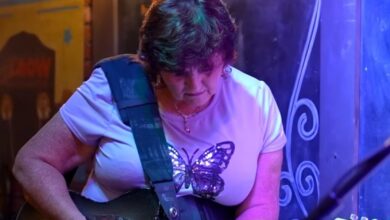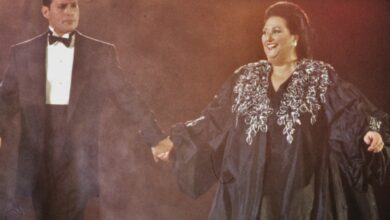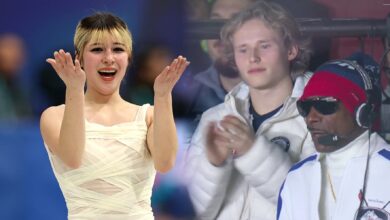Ace Frehley Proved in 1977 That No One Could Match the Sound of a Seventies Guitar Hero
April 1977, Tokyo — a night where the air felt electric, as though the entire Budokan was breathing in rhythm with KISS. The band had already taken America by storm, but Japan awaited them with a kind of reverence unseen elsewhere. The audience sat perfectly still, their silence a symphony of discipline. When the lights dimmed and the stage filled with smoke, Ace Frehley stepped forward, his Les Paul glowing under the spotlights, ready to command the storm.
Performing at Budokan meant entering a pantheon of legends. The Beatles, Deep Purple, and Zeppelin had left their mark there — and now it was KISS’s turn. The acoustics were immaculate, transforming every riff into a thunderclap. As the band stormed through “Cold Gin,” Ace’s moment arrived. The crowd leaned in, breathless. In Japan, silence wasn’t absence of passion; it was focus. They waited — thousands of hearts anticipating the moment he’d ignite the room.
Then it happened. Ace struck the opening chord of his solo, and the air split like glass. His tone was both jagged and smooth, the kind of raw precision only born from instinct. Each note danced dangerously close to chaos but never lost control. You could hear the tubes straining in his amp, feel the electricity surge through every cable, as if even the stage lights couldn’t keep up with his fire. It was 1970s magic — unpredictable, untamed, and unforgettable.
Unlike most guitarists of his era, Ace didn’t rely on pre-scripted solos. He crafted them on the spot — a conversation between man, machine, and moment. The Budokan crowd watched as he painted in sound, every phrase deliberate, every pause filled with tension. When he finally landed on a note that soared, the eruption was timed perfectly. Each bend seemed to pull gravity itself, wrapping echoes around the hall until it felt like he was dueling with his own reverb.
Then came the spectacle. Ace tilted his Les Paul toward the ceiling, and the pickups began to breathe — literally. White smoke billowed from the guitar like vapor from an engine leaving Earth. The Spaceman had achieved liftoff. But unlike a gimmick, this moment felt earned. The smoke was punctuation, not disguise. It said, “I control this chaos.” For the first time that night, Japan’s famously composed crowd broke their calm. Their cheers pierced the air like fireworks after a long silence.
At his best, Ace Frehley could make a guitar speak languages uncharted. The Tokyo solo remains one of those rare pieces of performance alchemy — where phrasing and restraint outshine speed or flash. Every run had intention; every sustain had emotion. There was poetry in his timing. He didn’t need to race across the fretboard; he simply let the guitar exhale, turning technical mastery into human warmth. It was proof that control can be more powerful than excess.
The 1977 tour represented KISS at their apex — a perfectly tuned spectacle of fire, makeup, and showmanship. Yet Ace’s solo that night stripped away the pyrotechnics and exposed something deeper: confidence born of chaos. While Gene prowled and Paul posed, Ace leaned back, half-grinning, channeling energy into melody. He didn’t compete with the theatrics; he transcended them. The Spaceman wasn’t just part of the machine — he was the soul of it.
When the last echoes faded, Budokan had witnessed something sacred. Ace had merged rock’s fiercest opposites — discipline and danger — into harmony. The smoke cleared, and he gave a subtle bow, like a samurai acknowledging victory. The crowd didn’t scream; they applauded, measured but mighty. For a moment, KISS wasn’t spectacle or controversy. They were artisans of sound, and Ace stood at the center of that transformation, a quiet craftsman cloaked in lightning.
Even today, the surviving footage still radiates that energy. Despite its grainy quality, you can feel the current — that unmistakable tone, soaked in midrange and attitude. Analog hums, string scrapes, and amp hiss become part of the experience. The imperfections only make it more alive. Close your eyes and you’re there again, among thousands, holding your breath as Ace bends a note that refuses to die.
Watching that moment now feels like time collapsing. The costume, the silver boots, the smoke — they fade into symbols of something more eternal: freedom. Ace Frehley embodied unfiltered creativity, joy that couldn’t be faked. It wasn’t nostalgia; it was liberation in motion. Decades later, that solo still tilts the earth slightly off its axis — proof that real personality can live in a single sustained note.
Fans still speak of that 1977 Budokan solo in the same breath as Hendrix’s Monterey or Page’s Madison Square Garden sets. It belongs to the same mythology — a moment when time stopped. The Spaceman didn’t just perform; he left orbit. Every puff of smoke, every glowing chord became part of KISS’s immortal legend. For all their theatrics, that night proved the power wasn’t in the costumes — it was in the conviction.
But now, replaying it carries an ache. In October 2025, Ace Frehley — the original Spaceman — passed away at seventy-four following complications from a fall. The silence that followed felt heavier than any amplifier hum. Musicians across generations revisited the Budokan footage, rediscovering that grin, that swagger, that effortless phrasing that could silence a crowd without saying a word. Every note now rings like a final goodbye — warm, defiant, eternal.
Play that Tokyo clip today and you’ll feel it — a message beyond words. It’s not just sound; it’s a man’s soul etched into vibration. The same tone that once rattled halls now echoes through memory, carrying the kind of immortality no fame can buy. The Spaceman may be gone, but his orbit remains — circling forever in sound and smoke.
And perhaps the image that captures it best is simple: Ace standing alone, shrouded in mist, guitar raised toward the heavens, one final note shimmering like starlight. It isn’t a scream of farewell — it’s a whisper that never fades. That moment, frozen between noise and silence, is rock ‘n’ roll distilled to its purest, most human form.





